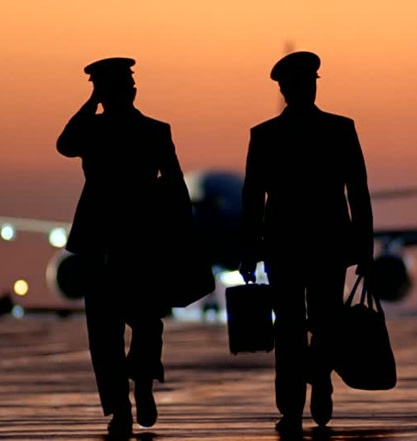44 Non-Technical Pilot Interview Questions To Practice

- Tell me about yourself.
- Interviewer is looking for a two to three minute snapshot of who you are and why you are the best candidate. Describe what you have done to prepare yourself for the position. Consider using a few examples.
- What defines a professional?
- A pilot who will be diligent in initial and recurrent training and in adhering to company standards. A person that is punctual, has effective communication skills, takes initiative during critical situations. A person who priorities knowledge and knows their own limitations.
- Where do you see yourself in five years?
- The interview wants to see that you have thought about your future and to get an idea of your ambition. They also want to see if you are using the position as a stop gap. Some employers expect that pilots use them as a career step and don’t intend to stay long term.
- What is your greatest weakness?
- Address this question by minimizing your weaknesses and emphasizing your strengths. Focus on professional traits rather than personal qualities and bring up any education or other opportunities you’ve used to improve upon your weaknesses. Do not show attempt to show yourself as perfect either. Interviewers want to see if you are self aware and that you have the ability to improve yourself. Don’t highlight a weakness if it is a core competency for the position.
- What is your greatest strength?
- The interviewer is looking for a strength related to the position. Be prepared to provide examples of your strength and how you’ve used it in past flying jobs. Some examples of strengths to highlight include attention to detail, taking the initiative, positive attitude, working well under pressure, having a desire to learn, problem solving, or working well within a team.
- What is a pilot’s role during an emergency?
- Maintain composure and awareness of the situation so that the pilot can operate within their expertise and knowledge to address the situation and assign tasks to other crew members as needed. Potentially mention how this is addressed in FAR 91.3 and what is means in practice.
- Why did you leave your last job?
- There are many reasons people leave jobs, but never talk negatively about a prior or current employer during an interview. Some common reasons for leaving positions are needing to relocate, personal responsibilities, that you were looking for better opportunities or for options to grow professionally.
- Have you ever had to deviate from a flight plan or employer instructions?
- Pilots will have to divert from plans during the course of their career. The interviewer will be interested to see your thought process behind doing so and that you addressed the deviation according to policy or procedure and in a well organized manner.
- Why should we hire you?
- Show an interviewer that you not only meet their current needs but will also be valuable for the companies future plans or dreams. Do you have experience in something they are planning to get in to and can you provide insight and help on this?
- How do you define success?
- Research the company paying particular attention to their mission statement and values to learn how the company sees success. Blend this with your personality and who you are and emphasize any areas where the company values overlap your own. Practice giving a balanced answer, illustrating how you would seek to improve your own performance while contributing to the companies mission.
- What is your greatest accomplishment?
- This is similar to the ‘what is your greatest strength’ question and can be addressed in a similar manner. Pick a personal accomplishment that shows you have qualities the company values and that are desirable for the position you are interviewing for. A few tips:
- Try showing some genuine passion when talking about your accomplishment.
- Don’t believe that your accomplishment is too small. Relating a small accomplishment that lines up with company values may have more impact that bringing up a large accomplishment.
- What can we expect from you in your first 90 days?
- Indicate that you will take an assertive approach to learning your role and the associated duties without burdening your supervisor. Emphasize your ability to learn quickly and show that you are goal oriented and well organized when taking on challenges.
- What qualities make a good pilot?
- Employers often seek these qualities in pilots:
- Calmness: being able to cope in high pressure situations.
- Knowledge of responsibility: pilots know their role in the safety and well being of the employer’s customers.
- Self motivation: pilots operate separate of supervisors and need to not only motivate themselves but other members of the crew.
- Teamwork: you must be able to demonstrate awareness of the role you play within a team outside of piloting duties. A key component of this is effective communication.
- Customer service: a good understanding of customer care is important to an employer.
- Do you have any questions?
- Do not pass up this opportunity to differentiate yourself. Do not ask ‘what’s in it for me’ related questions such as pay and benefits but rather focus on learning more about the company or the job’s challenges. Have a few questions prepared and have at least one of those focused around something you discovered while researching the company.
- Why are you a pilot?
- Think about the lifestyle and day-to-day job of a professional pilot that you find attractive. Attempt to convey your passion for flying.
- What lessons have you learned from mistakes in a previous job?
- Do not lie in any part of your interview. Make a particular point of being straight forward with this question. It is common in a pilot career to make a mistake and learn from it. Find examples where you have learned a positive lesson and have constructively integrated it into your work or flying.
- What have you done recently to improve as a pilot?
- Interviewers are looking for a goal oriented candidate. Bring up activities or education you have done related to self improvement. Show that you are committed to life-long learning, are good at time management, and are highly motivated.
- What was the most difficult decision you’ve made?
- The interviewer wants to know how strong your decision making and critical thinking skills are. Pick a challenge that shows you were successful in addressing a tough problem. Try to choose a challenge that highlights a strength to the role. Discuss your approach in weighing the options and what choice you made.
- How do you stay organized?
- You have some type of structure in which you complete your to-dos. Think about how you accomplish your tasks. Your system doesn’t need to be complicated, simpler is often better. Describe how you prioritize and then keep track your to-dos. Interviewers like thoughtful approaches but they also want to see that your system is flexible and that you are capable of addressing the unexpected.
- What are you favorite things about your current job?
- The interviewer is trying to gauge what you like to see if it’s likely that you will enjoy this new position. Work on finding aspects of your current job you enjoy that match up with the position you are applying to.
- What are your least favorite things about your current job?
- Do not speak negatively about current or previous jobs or coworkers during an interview. When answering this question discuss circumstances or tasks rather than people. An example would be that the position required an unreasonable amount of time for paperwork and that you would have rather had that time available for interfacing with passengers. Consider mentioning solutions you adopted for dealing with issues you dealt with.
- What would your leadership style be as a captain?
- If you haven’t been a captain yet don’t mention it. Think back to times when you took the lead and how you did so, even if they weren’t in pilot jobs. Interviewers will often not be seeking specific answers, but rather that you have thought out and follow a system when it comes to leading. Mention a specific example or two of you using your system.
- Describe a dispute that you had with a colleague?
- The interviewer wants to figure out your conflict management ability and general interpersonal skills. Avoid using a personal conflict as an example. Instead, use an example where you had a professional disagreement. Talk about how you communicated your position, how you listed to your coworker’s position, how you resolved the issue, and if appropriate how it impacted your relationship with your coworker. Avoid showing bitterness or resentment.
- How would your former supervisors describe you?
- Be honest! Do not risk your boss having a different statement should they be contacted. If you’re having trouble coming up with positive statements then try to turn a negative into a positive. For example, if your boss would say you often had late flights instead frame it that you were detail oriented in pre-flighting the airplane and flight.
- Have you ever failed a check-ride or required additional training?
- As with all interview questions, be honest! The employer will know your checkride history at some point. When mentioning failures bring up what you learned and how you sought to improve going forward.
- What was the hardest decision you’ve had to make in your career?
- It is usually better to use a professional decision as your example. The interviewer will want to know both what you consider your most difficult decision as well as learn about your approach to making the decision.
- Would you help load the airplane if the ground crew is running behind or was short handed?
- An employer will want to hear that of course you will do what is needed to make the operation run smooth. But also consider mentioning that you would need to know company procedure before doing so. For example, some cargo operators do not carry insurance to cover pilots for injuries sustained from loading an airplane.
- Do you have any flight violations, warnings, citations, accidents, or incidents?
- Same as the failed checkride question, be honest! The employer will find out anyway. Mention what happened, the lessons you learned, and what you did to improve.
- What are you looking for in an employer?
- Focus your answer on what makes you a good employee rather than what you can get from a job. Have a picture of a work environment that you would excel in.
- How would your current boss would describe you?
- Try describing why your boss values you rather than listing adjectives they might use to describe you. Three ideas for preparing for this question:
- Quote a performance review
- Start with a story and share takeaways
- Name a few positive traits with examples of each
- What do you do in your free time?
- The interviewer is using this question to determine if you are a good cultural fit for the company. They want to know if you will complement and contribute to improving the companies workplace and culture. When researching the in preparation for the interview look at the kinds of events and activities that the company highlights publicly. Areas to emphasize include activities and interests you share with the company, your volunteer activities, and activities that show you are serious about your career and are dedicated to continual learning towards it.
- Tell us about a difficult boss.
- Be careful not to appear bitter, not to complain, or not appearing as a difficult employee to work with. Do not place blame, trash talk, or throw your boss under the bus. End examples on a positive note and mention any lessons you learned.
- What is you past flying experience and history?
- Use this question to convey your passion and commitment to flying. Show how you’ve been mindful and deliberate with planning your career and working up through the needed steps.
- What other employers have you applied to? Which have you interviewed with?
- The interviewers may be scoping out their competition, seeing how serious you are about working as a pilot, or may be gauging the likelihood of you accepting a position with their company. If you’re applying to other pilot employers mention it to them and explain how you are actively exploring your options but that you are excited about this position. If you don’t have other interviews scheduled mention that you’re early in your job search. Regardless of where you are in applying to other companies, you want to convey to the interviewers that you are especially interested in their position.
- Would you fly fatigued?
- This is a straight forward answer of ‘of course not.’ Mention that it is a part of the responsibility of being a professional pilot to manage sleep in order to be well rested for duty. But also mention that there can be unforeseen circumstances (ex. – hotel fire alarm going off during the night) that would keep you from being fit for flight. Use this as an opportunity to ask about their companies fatigue policy in these circumstances.
- What does your resume not tell us about you?
- This is another opportunity to share your qualities and attributes that would enable you to be a successful employee. Make sure to keep this answer brief. A few examples you could consider:
- Share a strength that isn’t on your resume
- Share an intangible strength
- Explain why you want the job
- Share something personal
- What would you do if a crew member had been drinking?
- Whatever you do in this situation the priority is that the suspected crew member not go flying. The interviewer will likely not appreciate it if your answer is to immediately go outside of the team to report the person. The best approach would be to bring it up with the crew member in private. Mention your suspicion and that you want them to pull themselves off duty voluntarily. If they will not voluntarily leave duty then begin by reporting to the supervisor according to company policy. At no time do you want to be in view or earshot of the public while doing this and you need to avoid causing drama.
- What is the definition of crew resource management (CRM)?
- Crew resource management is a system and mode of interaction where you use all available resources to increase safety and improve the efficiency of operations. These resources can include procedures, equipment, team work, and interpersonal communication and are not limited to the flight deck.
- What makes you qualified for this position?
- This may be one of your better opportunities to highlight your skills and knowledge. Lead your answer with your most significant qualifications. Points to think about when practicing this answer:
- Find a unique angle. How are you different from the other candidates?
- Bring up something that did not fit or belong on your resume.
- This can be a time to bring up personal experiences.
- It is ok to show off a little.
Mistakes to avoid:
- Do not exaggerate or be insincere
- Do not just read your resume to the interviewers. Highlight your most important qualifications but also provide new insight that couldn’t be gained from your resume.
- Avoid typically answers. Try to find a way to show yourself as unique.
- Do not brag.
- What makes a good First Officer?
- A first officer is a professional pilot first and foremost. A professional is a safe and skilled pilot who understands and flies according to regulations and company procedures. First officer is a responsible, respectful person who is effective at working in a team. First officers need to be willing and able to be assertive with the courage to challenge captains to maintain the safety and legal operation of the airplane.
- Name a time when you went out of your way for a customer.
- Pilots are often on the front line of customer service in aviation and employers want to ensure that passenger service is a priority. The interviewer is looking for a specific example that showcases your ability to deliver excellent customer service.
- What is the importance of checklists and SOP?
- Standard operating procedures (SOP) and checklists ensure tasks or operations are completed correctly. SOPs ensure the airplane is flown according to manufacturer guidelines and appropriate regulations. And SOPs backed by proper checklist use allow 2 pilots that haven’t met before to fly together on an aircraft and fully understand what the other pilot is doing and expected to be doing.
- Why do you want to work for us?
- To effectively answer this question be knowledgable about the company. You want your answer to fit with the company’s culture and mission and to emphasize how the companies values align with your own. Also show that you’ve done research as to the fit by mentioning the benefits of working with this employer.
- Pilots are required to shoulder many responsibilities during the course of a flight. Please describe what these are.
- The duties of pilot in command or second in command are key among these. The pilot is responsible for the safety of the airplane and will maintain awareness of navigation, weather, airplane systems, the airplanes status within the air traffic control system, and will guide the other crew members on the flight. Most pilot jobs will also be customer focused. Interviewers will want to see that you will also be able to recognize and act on the needs of those customers and to represent the employer well.
Greg started his professional pilot journey in 2002 after graduating from Embry Riddle. Since that time he has accumulated over 8,000 hours working as a pilot. Greg’s professional experience includes flight instructing, animal tracking, backcountry flying, forest firefighting, passenger charter, part 135 cargo, flying for a regional airline, a national low cost airline, a legacy airline, and also working as a manager in charge of Part 135 and Part 121 training programs.



